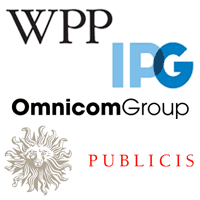

WPP reported an impressive 52 per cent increase in profit after tax, to £601m ($912m) for the first half of 2015. However this growth was not driven by sales but by improved operating performance and exceptional gains on the sale and revaluation of investments. Net sales, the most meaningful and accurate reflection of WPP’s top line growth, were up 5.2 per cent to £5bn ($7.6bn), but only 2.3 per cent on a like-for-like basis. Unlike the other three holding companies, WPP’s figures were largely unaffected by currency fluctuations, which accounted for just 0.5 per cent of the growth, with net acquisitions accounting for the remaining 2.4 per cent.
Omnicom had strong growth in the first half of 2015, with 5.2 per cent organic revenue growth from the same period last year. However reported revenue was down 1.3 per cent to $7.3bn from $7.4bn reported in the previous period, dragged down 6.8 per cent by foreign exchange rates due to the strong dollar, and increased only 0.3 per cent from net acquisitions.
Publicis had organic growth of just 1.2 per cent for the half year, however their reported revenue witnessed the highest growth of the four companies, increasing 35.3 per cent to EUR 4.5bn ($5.1bn). This significant increase is due partly to the weakening Euro, accounting for 14.2 per cent of the growth, and partly from net acquisitions, accounting for 19.9 per cent – largely due to the Sapient Corp. acquisition which competed in February 2015.
Interpublic Group of Companies (IPG), like its American rival Omnicom, also enjoyed strong organic growth, with 6.2 per cent. However, reported revenue was $3.6bn, only up 1.8 per cent, as the strong organic growth was offset by foreign exchange rates loses, reducing revenue by 5.1 per cent, with M&A activity adding 0.7 per cent.
Regionally, the UK was a strong performing market for Omnicom with 7.2 per cent organic revenue growth and IPG with 7.1 per cent. WPP’s UK growth was slower, at 2.8 per cent, and Publicis’ was -2.1 per cent. Both US-based holding companies Omnicom and IPG saw strong organic growth in North America, with 5.4 per cent and 7.0 per cent respectively. Asia Pacific was also a strong region for all of the holding companies, in particular for IPG, who reported organic growth of 9.1 per cent in the region. Latin America was a weaker region, with all experiencing negative organic growth, with the exception of WPP, who saw growth of 2.6 per cent.
Outlook
China’s weakening economy and the uncertainty around growth in emerging markets has caused turmoil in the financial markets over the past few months. However, this started in June and therefore has not impacted companies’ H1 2015 results.
Chris Sahota, Ciesco CEO, predicts that a more difficult Q3 and Q4 ahead can be expected for the big four advertising holding companies. At this time of year particularly, CEOs return from their summer vacations and review their Q3 and Q4 forecasts and will show caution.
Historically this environment of uncertainty leads to cuts in adspend and media campaigns being put on hold.
There is currently a lot of opportunity for new business to be won or lost for the four largest holding companies due to the current unprecedented surge in the number of companies reviewing which media agencies they use.
Notes
Source: All data obtained from WPP, Omnicom, Publicis and InterPublic Group of Companies’ 2015 interim reports and presentations.
Organic Growth: the year-on-year increase or decrease in revenue from the prior period, excluding the FX impact and net acquisition revenue
1: For WPP, net sales figures and organic net sales growth are used rather than revenue and organic revenue growth, as they show underlying trends more accurately, given the increase in both online media buying as principal together with pass-through costs for data investment management.
For further information please contact Ciesco Group.










